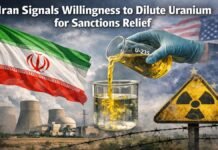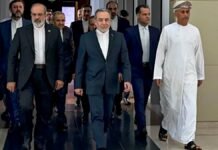
Key Points
- President Donald Trump declares complete US government boycott of 2025 G-20 summit in South Africa
- Boycott stems from allegations of violence and land seizures targeting white minority farmers of European descent
- South African government denies discrimination claims, citing continued economic disparities favoring white population
- US decision marks rare withdrawal from major international diplomatic forum by a global superpower
- Summit scheduled November 22-23 in Johannesburg will proceed despite American absence
Washington/Johannesburg: In a dramatic diplomatic move that has sent shockwaves through international relations, President Donald Trump announced that the United States will completely boycott the 2025 G-20 summit scheduled to take place in South Africa later this month. The decision represents one of the most significant American withdrawals from a major multilateral forum in recent history and signals a sharp deterioration in US-South African relations.
The President announced a detailed social media post, explicitly accusing the host nation of systematically mistreating its minority white farming community. Trump stated that South Africans of Dutch, French, and German ancestry are facing widespread violence, intimidation, and forcible land confiscation. His statement characterized the situation as a humanitarian crisis affecting descendants of European settlers who have farmed in the region for generations.
Allegations of Systematic Discrimination
In his announcement, President Trump provided specific details about the alleged persecution. He claimed that white farmers, many of whom trace their lineage to Afrikaner, French Huguenot, and German immigrant communities, are experiencing coordinated attacks on their properties and livelihoods. The President asserted that these farmers face not only physical violence but also systematic land seizures conducted without proper legal processes or fair compensation.
Trump went further, declaring that hosting the G-20 summit in South Africa under these circumstances is “shameful” and incompatible with the values that the international community should uphold. He emphasized that the boycott extends beyond his personal attendance, clarifying that no US government official at any level will participate in the summit as long as the current situation persists.
This represents an expansion of previous statements, as Trump had initially indicated only that he personally would not attend. The comprehensive nature of this boycott affects all potential US delegation members, including cabinet secretaries, diplomatic representatives, and technical staff who would typically participate in summit proceedings and side events.
South Africa Rejects Claims as “Completely False”
The South African government has issued strong rebuttals to the American President’s allegations. Government spokespersons have categorically denied claims of systematic discrimination against white farmers, describing them as politically motivated distortions that ignore the country’s complex historical and economic realities.
South African officials point to comprehensive data showing that white South Africans, including farming communities, continue to enjoy significantly higher average living standards, educational attainment, and economic opportunities compared to the country’s Black majority population. These disparities, they argue, reflect the persistent legacy of apartheid-era policies that created vast wealth gaps along racial lines.
President Cyril Ramaphosa has personally addressed these allegations on multiple occasions, most recently reiterating that claims of widespread oppression against white farmers are “completely false.” Ramaphosa has acknowledged isolated incidents of farm violence but emphasizes that crime affects all South African communities regardless of race, and that the government is committed to protecting all citizens equally under the law.
The South African administration has also defended its land reform policies, which aim to address historical injustices by redistributing agricultural land to previously disadvantaged communities. Officials maintain that these reforms operate within constitutional frameworks and include compensation mechanisms, contrary to allegations of arbitrary confiscation.
Escalating Diplomatic Tensions
President Trump’s boycott announcement represents the latest escalation in increasingly strained US-South Africa relations. Earlier this year, he made the extraordinary suggestion that South Africa should be “expelled from the G-20” due to what he characterized as a deteriorating human rights situation. This statement, delivered during a speech in Miami, marked an unprecedented call for a founding G-20 member to be removed from the organization.
The Trump administration’s tough stance extends beyond presidential rhetoric. US Secretary of State Marco Rubio previously boycotted the G-20 Foreign Ministers’ meeting held several months ago in Cape Town. Rubio justified his absence by criticizing what he described as the conference’s excessive focus on issues such as diversity, equity, inclusion initiatives, and climate change policies, which he characterized as ideologically driven distractions from core diplomatic and economic concerns.
These coordinated actions suggest a deliberate strategy by the Trump administration to isolate South Africa diplomatically and potentially pressure the government to alter its domestic policies. However, critics argue that this approach undermines multilateral cooperation and damages America’s traditional role as a convener of international dialogue.
Rare Withdrawal from International Forum
Diplomatic analysts characterize the US boycott as an exceptionally rare move in the context of major international summits. The G-20, which represents the world’s largest economies and accounts for approximately 85% of global GDP, serves as a critical forum for coordinating economic policies, addressing financial crises, and managing global challenges.
Since its elevation to the leaders’ level in 2008 during the global financial crisis, the G-20 has maintained broad participation from member states regardless of bilateral political tensions. Previous disagreements between member nations have typically been managed through diplomatic channels without complete withdrawals from summit proceedings.
The US decision to boycott entirely, rather than simply sending lower-level representation or using the summit platform to voice concerns directly, represents a significant departure from established diplomatic norms. International relations experts suggest this approach may diminish American influence over the summit’s outcomes and create opportunities for other major powers to shape the global economic agenda without US input.
Summit to Proceed as Scheduled
Despite the American absence, South African officials have confirmed that the G-20 summit will proceed as scheduled in Johannesburg from November 22nd to 23rd. The summit is expected to draw leaders and senior representatives from the remaining G-20 member nations, along with guest countries and international organizations.
The agenda for the two-day gathering includes critical global issues that require coordinated international responses. Participants will address the current state of the global economy, including concerns about inflation, growth prospects, and financial stability. Energy transition strategies, particularly focusing on sustainable development and climate change mitigation, will feature prominently in discussions.
Development cooperation, especially regarding support for low-income nations facing debt challenges and economic recovery obstacles, represents another key agenda item. Additionally, delegates are expected to discuss digital transformation, trade policy coordination, and pandemic preparedness based on lessons learned from recent global health crises.
Implications for G-20 Leadership Transition
The boycott occurs at a particularly significant moment in G-20 governance, as South Africa currently holds the rotating presidency of the organization. Under standard procedures, the United States is scheduled to assume the G-20 presidency in 2026, placing it in the position of organizing and hosting the next summit cycle.
President Trump has already outlined his vision for American leadership of the organization, announcing plans to hold the 2026 G-20 summit in Miami, Florida. This choice of venue would mark a departure from the tradition of hosting such gatherings in capital cities and reflects Trump’s personal connections to the Miami area.
The prospect of this leadership transition adds complexity to the current diplomatic standoff. As the incoming president of the organization, the United States would typically work closely with the current presidency to ensure smooth transitions and continuity of initiatives. The boycott disrupts this coordination process and may create challenges for policy continuity between the South African and American presidencies.
International Reactions and Future Implications
The international community has watched these developments with concern, as the US-South Africa confrontation threatens to inject bilateral political conflicts into multilateral economic cooperation frameworks. Some G-20 members have expressed disappointment at the American absence, arguing that major global challenges require full participation from all leading economies.
However, other nations have refrained from public comment, potentially reluctant to choose sides in what they view as a bilateral dispute. This cautious approach reflects the delicate balance many countries must maintain in their relationships with both the United States and South Africa, as well as concerns about setting precedents for politically motivated summit boycotts.
The situation also raises broader questions about the future of multilateral cooperation in an era of increasing geopolitical tensions and divergent national priorities. As countries increasingly use participation in international forums as leverage in bilateral disputes, the effectiveness of organizations like the G-20 in fostering consensus and coordinating global responses may face growing challenges.
The Johannesburg summit will serve as a test of whether the G-20 can maintain its relevance and effectiveness despite the absence of one of its most powerful members, and whether the remaining participants can demonstrate unity and purpose in addressing shared global challenges.





















































